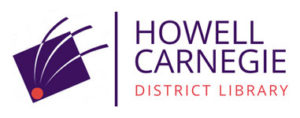The purpose of the Howell Carnegie District Library’s (HCDL) Collection Development Policy is to guide and assist the library staff in the selecting and maintaining of the collection as reflected in the library’s missions and goals. It is a description of what the library collects. A written policy:
- helps to answer questions posed by the public regarding the presence or absence of certain materials in the collection
- helps to explain the criteria used for materials selection
- aids library staff in selecting and acquiring a useful, well-rounded collection of books and other materials to meet the needs of the community
Selection of a work does not necessarily imply the library’s approval of the actions or ideas contained in that work. This document is subject to periodic review, update and possible change.
Definitions
The term “Library Materials” means books, magazines, DVDs, CDs, library programs, items in the Library of Things, or other synonyms as they may occur in the Policy having the widest possible meaning. This statement of Policy applies to all Library Materials in the collection, including adult, young adult and juvenile. However, this Policy and the term “Library Materials” does not apply to Internet sites available through the Library’s computers or Internet collection. The Library has no control over the content of the Internet. Please see the Computer and Internet Use Policy for any issues related to computer or Internet Use.
The term “selection” refers to the decision to add, retain or withdraw material in the collection. It does not refer to reader guidance or removal of material pursuant to the Challenges to Materials section.
Statement on Intellectual Freedom, Censorship and Access
In addition to the selection procedure and criteria mentioned in this document, HCDL believes in, supports, and follows the principles of intellectual freedom. Selection of library materials is predicated on the library patron’s right to use library materials and, similarly, their freedom from censorship by others. Basic to the policy is the First Amendment of the Constitution of the United States, Library Bill of Rights and The Freedom to Read as adopted by the American Library Association.
The library assures free access to its holdings. All patrons are free to select or reject for themselves any item in the collection. Selection is not made based on anticipated approval or disapproval by patrons or Library users, but solely on the merits of a work, without regard to the race, nationality, political or religious views, or sexual orientation or gender identity of the writer.
Processing and shelving of materials shall in no way reflect a value judgment of the materials. There will be no labeling of any item or of its catalog records to indicate its point of view or bias. Most materials will be shelved in their proper order on open shelves, freely and easily accessible to the public. Also, some items are shelved separately for easier patron access. The Library director/designee shall have the authority to determine where materials are located in the Library and how they are displayed.
The library will not be responsible for a child’s selection of library materials. That responsibility rests wholly on the minor child’s parent or legal guardian. Selection of material is not restricted by the fact that the child may be able to access materials their parent/legal guardian may find objectionable. The Library respects each individual parent’s or guardian’s right to supervise their children’s choice of reading materials. Further, the Library does not have the right to act in loco parentis (in place of the parent). Therefore, a parent who chooses to restrict the materials their children select must accompany those children when they use the collection to impose those restrictions.
Selection Responsibility, Criteria and Procedure
The materials collected at HCDL encompass a wide range of subjects to meet the diverse needs of the community.
The Board of Trustees delegates this responsibility for selection to the Library Director. The Director is in turn responsible for delegating the workload among the department heads. The Head of Reference and Adult Services is responsible for selection of adult materials. The responsibility for selection of Teen and Children’s materials falls to the Head of Youth Services. The department heads then divide the workload among their current staff. Selection of materials for use at HCDL is a process that utilizes the skills, education, and experience of members of the library staff.
When making selection decisions, library staff will rely upon a number of tools, as well as general criteria. Selectors use reviews and information found in a variety of sources and catalogs, as well as suggestions and requests from library patrons. Because the large volume of materials purchased annually is too great for the selectors to order every item individually, the library employs some vendor-controlled order plans as one part of selection. Reviews of materials
published in various professional periodicals, as well as general interest periodicals, will be consulted. In addition to the reviews, and in cases where evaluative reviews are not available, library staff will rely on professional knowledge and judgment and the selection criteria listed below. Access to Information on the Internet See the Computer and Internet Use Policy and Computer and Internet Procedure and Rules for additional information.
Website linking policy
HCDL provides links from our Library website to other websites. Links selected will meet the criteria from the Collection Policy used in evaluating any reference source (e.g. authoritative, current, accurate, relevant, and meets the informational needs of the Howell Community). HCDL provides these links as a convenience. The inclusion of a link does not imply any association with the link’s operators. A site will be removed if it is determined that it is no longer active or updated, the content has changed and no longer falls within the guidelines of the Collection Policy, or the site has been superseded by a more appropriate site.
Since linked sites are not under the control of HCDL, the Library is not responsible for their contents, for any link contained in a linked site, or any changes or updates to such sites.
Criteria for Selection
The following criteria are considered when selecting material. An item need not meet all of these criteria in order to be acceptable.
- Contemporary significance or permanent value
- Current
- Factual
- Diversity of viewpoint
- Authority of author
- Relation of work to existing collection
- Price, format, and ease of use
- Scarcity of information in subject area
- Available space
- Availability of material through interlibrary loan
- Popular demand: The Library will make an effort to have materials available that are in high demand by the public; however, selections by popular demand will still be guided by consideration of merit, use and the specific principles for selection.
- Duplication of materials already in the collection, i.e., purchase of additional copies of materials, shall be governed by intrinsic or historical value, or immediate need
- Collection objectives
- Community relevance / local interest
- Audience for material
Patron Suggestions
Patrons may make suggestions via an online form available on the HCDL website. These are submitted to the appropriate department for consideration. Consideration for selection will be made according the criteria above.
Resource Sharing and Interlibrary Loan
HCDL participates in MelCat, the statewide resource sharing/ Interlibrary Loan (ILL) system which is part of MeL, Michigan eLibrary. The Howell Carnegie District Library is a member of The Library Network (TLN) and participates in reciprocal borrowing.
Gifts
Materials donated to HCDL may be used in the collection if they meet the criteria of the Collection Development Policy and Procedure. The materials shall be accepted only if there are no restrictions placed on them and the Library has exclusive authority to determine how gifts that are not included in the collection are retained, sold or otherwise disposed of. On-demand evaluation of materials is not available. See the Gift and Donations Policy
Replacement
Need for replacement in each case is weighed with regard to materials that meet the same criteria as used by the Collection Development Policy and Procedure. It is not the library’s policy to automatically replace all materials withdrawn because of loss, damage, or wear. Each case is weighed individually.
Challenged Materials
No material shall be removed from the Library’s collection until all steps in the following process have been completed.
- Patrons (“Requester”) who object to Library Materials will be sent to the Director/designee.
- The Director/designee will discuss the Library Materials in question with the Requester, attempting to resolve the concern to both the Requester’s and Library’s satisfaction.
- If the Requester wishes to carry the request further, the Director/designee will provide the Requester with a copy of the Materials Selection Policy, including the Request for Reconsideration of Library Materials (“Request for Reconsideration”).
- Once a completed, signed copy of the Request for Reconsideration is received, the Library Director shall decide the Request for Reconsideration, taking into consideration the Library’s Materials Selection Policy and any other relevant information to reach a decision. The Director may consult with any other staff or consultants when making this decision.
- The Library Director shall send the decision in writing to the complainant within seventy-five (75) days of the receipt of the completed Request for Reconsideration form. If the decision is that the questioned material should be removed from the collection, the Requester will be notified in writing by the Library Director and all copies of the item will be withdrawn. If the decision is that the questioned material is to be retained, the Requester will be notified in writing by the Library Director that the material will be retained.
- A written appeal of the Library Director’s decision may be made by the Requester to the President of the Library Board within ten (10) business days after the written decision is made by the Library Director. Prior to the written appeal to the Library Board, the Requester will meet with the Library Director. The Library Board will review any documentation it deems necessary to decide within sixty (60) days of receipt of the appeal.
- The Library Board serves as the final authority in cases involving retention or withdrawal of Library Materials.
Weeding/Collection Maintenance
The collection shall be periodically examined for the purpose of eliminating obsolete, damaged, duplicate, or unneeded materials, and for binding or repair of materials, in order to maintain a balanced, attractive and useful Library Materials collection.
March 2024



